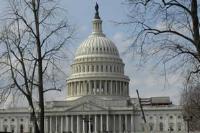The Supreme Court in Washington D.C. started last week its consideration of whether CO2 emissions cause specific harm to the environment and whether federal authorities are indeed obliged to regulate them under existing US law.
The plaintiffs are a mixed bag of 12 states, a few cities and environmental groups. Their first challenge will be to convince the Supreme Court judges that some damages, which could be qualified in monetary value, have occurred due to Environmental Protection Agency (EPA) inaction to regulate CO2 as a pollutant. While there is a growing acceptance that man-made CO2 emissions contribute to global warming, it will be very difficult to demonstrate that plaintiffs have suffered any specific harm.
The State of Massachusetts—one of the plaintiffs—claims that its coastal areas are affected by stronger and more frequent hurricanes. A comprehensive article in the Washington Post last weekend provided ample evidence that many coastal houses have in effect become impossible to insure.
The plaintiffs’ next challenge will be to convince the Supreme Court judges that hurricanes can be linked to global warming. Were they to convince the judges, it would have huge ramifications for the way in which CO2 emissions in the US would be regulated. The plaintiffs will then be able to jump on the opportunity to curb emissions from especially the power generating industry.
Supreme Court judge Atonin Scalia’s statement on the first day in court does not bode well for the outcome: "Troposphere, whatever. I told you before I am not a scientist. That’s why I don’t want to have to deal with global warming, to tell you the truth."
New Source Rule—another claim of federal inaction
Earlier this autumn, another first-of-a-kind case was heard by the Supreme Court. A coalition of environmental groups appealed a Washington D.C. district court decision from March 2006 overriding the federal New Source Review Rule (NSR) related to nitrogen, sulphuric and particulate emissions from coal-fired power plants. NSR ensures that air quality is not significantly degraded from the addition of new and modified factories, industrial boilers and power plants. In areas with unhealthy air, NSR assures that new emissions do not slow progress toward cleaner air. In areas with clean air, especially pristine areas like national parks, NSR assures that new emissions do not significantly worsen air quality. The NSR program also assures people that any large new or modified industrial source in their neighbourhoods will be as clean as possible, and that advances in pollution control occur concurrently with industrial expansion.
The Bush administration inherited a plethora of court cases against aging power plants for their lack of compliance with NSR. Instead of pushing forward with litigation, the EPA substantially weakened the rules in 2003, in effect letting the power generators off the hook.
Inefficient coal power plants to retire with Bush
Both these cases will not be decided upon until next spring. If the Supreme Court decides that the EPA should indeed regulate CO2-emissions under the Clean Air Act, and that a whole string of coal-fired power plants has been granted unjust grace from environmental requirements under NRS, a completely new landscape opens up for carbon constraints in the USA. All sources of CO2 emissions will come under scrutiny and it could also lead to a well deserved retirement of old polluting and inefficient coal fired power plants. The Bush administration will regardless of the outcome of these cases be cajoled by both the new Democratic House and Senate majorities to consider more than just R&D and voluntary programs to reduce greenhouse gas emissions. A fair number of businesspeople and Republican politicians want to see some changes to the US climate policies as well.




